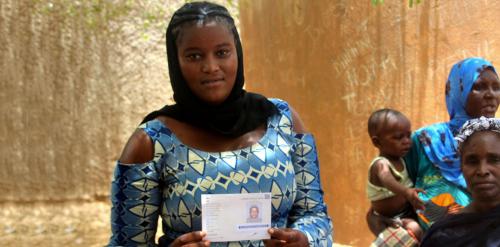Mali not fulfilling its ‘sovereign role’ in protecting its people: UN human rights expert
In an effort to better protect people and their property throughout Mali, the international community must honour commitments to help reduce violent extremism, chronic insecurity and ineffective government, said the United Nations expert on human rights in the country, Alioune Tine, on Thursday.

Ahead of Mali's 2018 presidential elections, this young women is picking up her new voter's card at an electoral station in Gao, in the country's north.
At the end of a 12-day fact-finding visit, the independent expert said that the “general climate of impunity has been aggravated by the chronic dysfunction of the judiciary with magistrates on strike for more than 70 days.
"The state has not fulfilled its sovereign role in protecting property and people and bringing perpetrators of criminal acts to justice," added Mr. Tine.
He pointed to a “resurgence of confrontations between members of different communities, the settling of accounts, targeted killings, the use of explosive devices, attacks on humanitarian convoys, kidnappings, robberies, rapes and sexual violence.”
This visit comes just weeks after the formation of a new government, following crucial Presidential elections. A failed military coup in 2012 to remove the then-president erupted in chaos, allowing rebel groups to seize northern parts of the country.
The UN Stabilization Mission in the country, MINUSMA, has become the deadliest peacekeeping mission in the world.
“In the north, as in the centre of the country, there is a real climate of fear and insecurity with a major impact on the lives of people, haunted by daily violence,” said Mr. Tine, in a statement. “This situation is due to the absence of certain state authorities in Timbuktu, Gao, Kidal, Mopti and Menaka, including the absence of judiciary, administrative, defense and security systems.
He said that “no woman can board a bus between Gao and Bamanko without risk of physical or sexual violence.” He added that “security measures must be taken so that Mali avoids a lost generation of schoolchildren.”
He noted that more than 332,400 children were denied their right to education during the last school year, while teachers feared attack by armed extremist groups.
The independent expert will present his report to the Human Rights Council in March 2019. During the visit he met members of the Malian Government, political opposition, international community, Malian armed forces, civil society representatives and traditional leaders.
Source:United Nations
- 353 reads
Human Rights
Ringing FOWPAL’s Peace Bell for the World:Nobel Peace Prize Laureates’ Visions and Actions

Protecting the World’s Cultural Diversity for a Sustainable Future

The Peace Bell Resonates at the 27th Eurasian Economic Summit

Declaration of World Day of the Power of Hope Endorsed by People in 158 Nations

Puppet Show I International Friendship Day 2020

